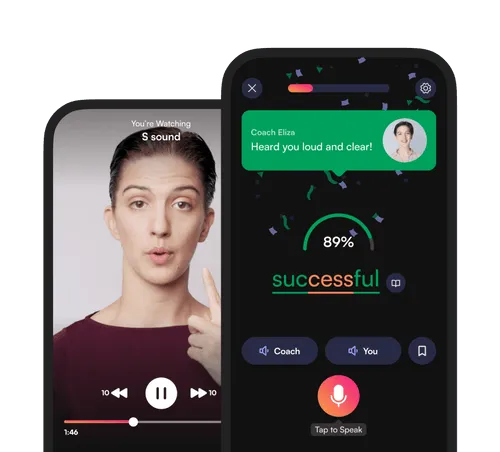Clear and confident English is invaluable in the sales industry, particularly when dealing with international clients or conducting business in English-speaking countries.
A salesperson with strong communication can effectively convey the value proposition of their product, address objections, and tailor pitches to their clients more successfully.
So without further ado, here are 50 English sales vocabulary terms that will have you closing the deal with ease in no time. Not sure how to pronounce a sales term? Consult our IPA pronunciation guide for guidance!
1. Prospect /ˈprɑˌspɛkt/ A prospect is a potential customer who has shown interest in the product or service.
"I've identified several new prospects in the healthcare sector."
2. Lead /liːd/ A lead is a person or company that has shown interest in the product or service, often indicated by providing contact information.
"We received a lead from our online advertising campaign."
3. Cold Calling /koʊld ˈkɔlɪŋ/ Making unsolicited calls to potential customers who have not yet expressed any interest in the product or service.
"I spend two hours a day cold calling to generate new leads.”
4. Warm Calling /wɔrm ˈkɔlɪŋ/ In contrast to cold calling, warm calling involves making calls to potential customers who have shown some level of interest or connection with the company or its offerings.
"Warm calling tends to yield better results than cold calling."
Take your free accent assessment Get to know your pronunciation level and get 7 days of lessons for free on the BoldVoice app.
Start Free Trial
5. Pitch /pɪtʃ/
A concise presentation of a product or service's features, benefits, and value proposition.
"I'm working on refining my pitch for the upcoming sales meeting."
Investing in accent reduction can be highly beneficial for sales professionals focused on making pitches, as it enhances their ability to communicate clearly with clients from diverse language backgrounds. And for a more cost-effective accent-training solution, pronunciation apps like BoldVoice can offer instant feedback on your speech.
6. Sales pitch /seɪlz pɪtʃ/ While a pitch can be a persuasive presentation of any business idea, a sales pitch pertains directly to making a sale. Sales pitches are used to convince a prospect to buy a product or service.
"His sales pitch was so compelling that the client signed the contract on the spot."
7. Value Proposition /ˈvæljuː ˌprɑpəˈzɪʃən/ An important term in English sales vocabulary, a value proposition is the unique value a product or service offers to customers, usually stated in terms of benefits.
"Our value proposition focuses on delivering high-quality products at competitive prices."
8. Benefit /ˈbɛnɪfɪt/ The advantage or positive outcome that a customer gains from using a product or service.
"One of the key benefits of our software is its ability to save time for users."
9. Feature /ˈfiːtʃər/ A feature is a distinctive aspect or characteristic of a product or service.
"The new smartphone's most notable feature is its long-lasting battery life."
10. Objection /əbˈdʒɛkʃən/ A concern or reason given by a prospect for not buying the product or service.
"Addressing objections effectively is crucial in closing a sale."
11. Objection Handling /əbˈdʒɛkʃən ˈhændlɪŋ/ The process of addressing and overcoming objections raised by prospects to move the sales process forward.
"Our sales training includes techniques for effective objection handling."
12. Closing /ˈkloʊzɪŋ/
The final stage of the sales process where the deal is completed and the customer commits to buying.
"She's excellent at building rapport and closing deals."
13. Closing Techniques /ˈkloʊzɪŋ ˌtɛknikz/ Strategies or methods used to persuade a prospect to make a buying decision and close the sale.
"Learning various closing techniques is essential for successful sales professionals."
14. Follow-up /ˈfɑloʊˌʌp/ Following up involves contacting a prospect or customer after an initial interaction to maintain communication and build relationships.
"Don't forget to do a follow-up call after sending the proposal."
15. Pipeline /ˈpaɪpˌlaɪn/ A pipeline is the series of steps and stages that a potential customer moves through in the sales process.
"Our sales pipeline is full, but we need to focus on moving prospects to the next stage."
16. Sales Funnel /seɪlz ˈfʌnəl/ A visual representation of the stages a prospect goes through before making a purchase, starting from awareness to purchase.
"Understanding the sales funnel helps us identify areas for improvement in our marketing strategy."
17. Conversion /kənˈvɜrʒən/ The act of turning a prospect into a paying customer.
"Our website's conversion rate has increased by 10% this quarter."
18. Qualified Lead /ˈkwɑlɪˌfaɪd lid/ A lead that meets specific criteria indicating a higher likelihood of becoming a customer.
"We prioritize following up with qualified leads over unqualified ones."
19. Unqualified Lead /ʌnˈkwɑlɪˌfaɪd lid/ Alternatively, a lead that does not meet the criteria indicating a high likelihood of becoming a customer is considered to be an unqualified lead.
"We need to filter out unqualified leads to focus on more promising opportunities."
20. Target Audience /ˈtɑrɡɪt ˈɔdiəns/ The specific group of people or businesses that a product or service is intended for.
"Our target audience consists of young professionals aged 25-35."
21. Client /ˈklaɪənt/ A person or organization that purchases goods or services from another person or business.
"Our biggest client is a multinational corporation."
22. Customer /ˈkʌstəmər/
A person or entity that buys goods or services from a business.
"We have a loyal base of repeat customers."
23. Decision-maker /dɪˈsɪʒənˌmeɪkər/ The person within an organization who has the authority to make decisions about purchasing products or services.
"We need to identify the decision-maker to move the sale forward."
24. Stakeholder /ˈsteɪkˌhoʊldər/ Any person or group with an interest or concern in the success of a business, including employees, customers, investors, and suppliers.
"We need to consider the needs of all stakeholders when making decisions."
25. Account /əˈkaʊnt/ Affairs relating to a customer or client, especially one with whom a business has a continuing relationship.
"She manages several key accounts for the company."
26. Territory /ˈtɛrəˌtɔri/ A specific geographic area assigned to a salesperson to manage and develop business.
“He's responsible for the North East territory."
27. Networking /ˈnɛtwɜrkɪŋ/ Building and maintaining relationships with others to exchange information and develop contacts, especially to further one's career or business interests.
"Attending industry events is a great way to network."
Looking to improve your own networking skills? Explore these 15 Essential Networking Phrases in English .
28. Referral /rɪˈfɜrəl/ A recommendation from a satisfied customer or contact to a potential customer.
"We get a lot of business through word-of-mouth referrals."
29. Cross-selling /krɔs ˈsɛlɪŋ/ Offering additional or complementary products or services to a customer who is already buying something.
"Would you like to add insurance to your purchase? It's a popular cross-selling option."
30. Upselling /ʌpˈsɛlɪŋ/ Persuading a customer to buy a more expensive version of a product or to add upgrades or additional features.
"We trained our staff to be skilled in upselling premium packages."
31. Negotiation /nɪˌɡoʊʃiˈeɪʃən/ The process of reaching an agreement through discussion and compromise, often regarding terms of a sale.
"Successful negotiation often results in a win-win outcome for both parties."
32. Discount /ˈdɪskaʊnt/ A reduction in the price of a product or service offered to a customer.
"We can offer a 10% discount for bulk orders."
33. Contract /ˈkɒntrækt/ A legally binding agreement between two or more parties outlining the terms and conditions of a sale or service.
"We need to review the contract before signing."
34. Proposal /prəˈpoʊzəl/
A formal offer or plan presented to a prospect or client, outlining the terms and benefits of a proposed agreement.
"We submitted a detailed proposal in response to the client's request."
35. Quotation /ˈkwoʊˌteɪʃən/ An estimate of the price for goods or services provided by a seller to a potential buyer. In this context, “quotation” is often shortened to “quote.”
"We sent them a quote for the equipment they requested."
36. Sales Cycle /seɪlz ˈsaɪkəl/ The series of stages a salesperson goes through from initial contact with a prospect to closing the sale.
“Our average sales cycle lasts about three months."
37. Revenue /ˈrɛvəˌnu/ The total income generated by a business from its sales of goods or services.
"Our company's revenue increased by 20% last year."
38. Profit Margin /ˈprɒfɪt ˈmɑrdʒɪn/
The percentage of revenue that exceeds the cost of goods sold, representing the profitability of a business.
"We need to increase our profit margin to remain competitive."
39. Return on Investment /rɪˈtɜrn ɒn ɪnˈvɛstmənt/ Return on investment (ROI) refers to a measure of the profitability of an investment, calculated as the ratio of the net profit to the cost of the investment.
"Our marketing campaign generated a high ROI."
40. Key Performance Indicator /ki pərˈfɔrməns ˈɪndɪˌkeɪtər/ Key performance indicators (KPIs) are quantifiable measures used to evaluate the success of an organization, department, or individual in achieving objectives.
"One of our key KPIs is customer satisfaction."
41. Sales Target /seɪlz ˈtɑrɡɪt/ A specific goal or quota set for salespeople to achieve within a defined period.
"We exceeded our sales target for the quarter."
42. Forecast /ˈfɔrkæst/ A prediction or estimate of future sales or financial performance.
"Our sales forecast for next year looks promising."
43. Commission /kəˈmɪʃən/ A percentage of the sales revenue paid to a salesperson as compensation for closing a deal.
"She earns a generous commission for every sale."
44. Incentive /ɪnˈsɛntɪv/ Something that motivates or encourages someone to take a particular action, often offered as a reward for achieving certain goals.
“We offer bonuses as incentives for meeting sales targets."
45. Territory Management /ˈtɛrətɔri ˈmænɪdʒmənt/ The strategic planning and organization of sales activities within a designated geographic area.
"Effective territory management ensures comprehensive coverage of potential customers."
46. Time Management /taɪm ˈmænɪdʒmənt/ The process of planning and controlling how much time to spend on specific activities to maximize productivity and efficiency.
"Improving time management skills is essential for sales success."
47. Presentation /ˌprɛzənˈteɪʃən/ A formal talk or demonstration given to an audience, often to explain or promote a product, service, or idea.
“She delivered a compelling presentation to the client."
48. Product Knowledge /ˈprɒdʌkt ˈnɒlɪdʒ/ A salesperson's understanding of the features, benefits, and applications of the products or services they are selling.
"His extensive product knowledge helps him build trust with customers."
49. Competitive Analysis /kəmˈpɛtɪtɪv əˈnæləsɪs/ Evaluating the strengths and weaknesses of competitors to identify opportunities and threats in the market.
"We conducted a competitive analysis to understand our position in the industry."
50. Closing the Deal /ˈkloʊzɪŋ ðə dil/ The final step in the sales process where the agreement to purchase is made between the salesperson and the customer.
"She's skilled at building rapport and closing the deal."
Ace Your Next Sales Pitch with BoldVoice English sales vocabulary is a valuable piece of the puzzle, but it’s not the only key to clear and effective communication in sales.
While having an accent is natural and often adds character to one's speech, it's essential to ensure clarity and intelligibility. A clear accent helps avoid misunderstandings and ensures that the message is delivered with confidence.
If a clear and confident accent is what you’re after, look no further than the BoldVoice app. Designed to teach non-native English speakers the ins and outs of the American accent, it can transform your performance in the sales world in no time. Give it a try with the 7 day free trial and start experiencing confident speech!


 Start Your Free Trial
Start Your Free Trial